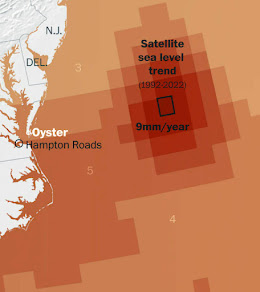 |
| Most of Hog Island has eroded into the Atlantic Ocean. (Photo map by The Washington Post) |
Buddy Bell, born on Hog Island, told the writers, "I was the next-to-last kid born on there. At one time the island was two miles wide, and now you can throw a shell across it." His family, like many on the island, barged their homes to Oyster, Va., and started over.
Now Oyster is "threatened by a fast-rising ocean, as is much of the U.S. East Coast," they write. "The menace today is different: human-caused climate change. But for some in Oyster, the question of the past echoes today: stay or go?"
Global warming is expanding the ocean, and it's impossible to know how high it will rise. Tide gauges have measured sea levels since 1927, and readings in places like nearby Hampton Roads have been grim. The Post reports, "Seas there rose by more than six millimeters annually over the past 30 years, compared with four millimeters per year during the three decades before."
 |
| Post map shows hotspot is sea-level rise. |
"Oyster now sits near this emerging sea-level-rise hot spot," the reporters write, "and so does part of the legacy of life on Hog Island." The Virginia Coast Reserve Program for the Nature Conservancy, which owns much of the land around Oyster, is hoping to help the community develop a global warming relocation plan.
No comments:
Post a Comment